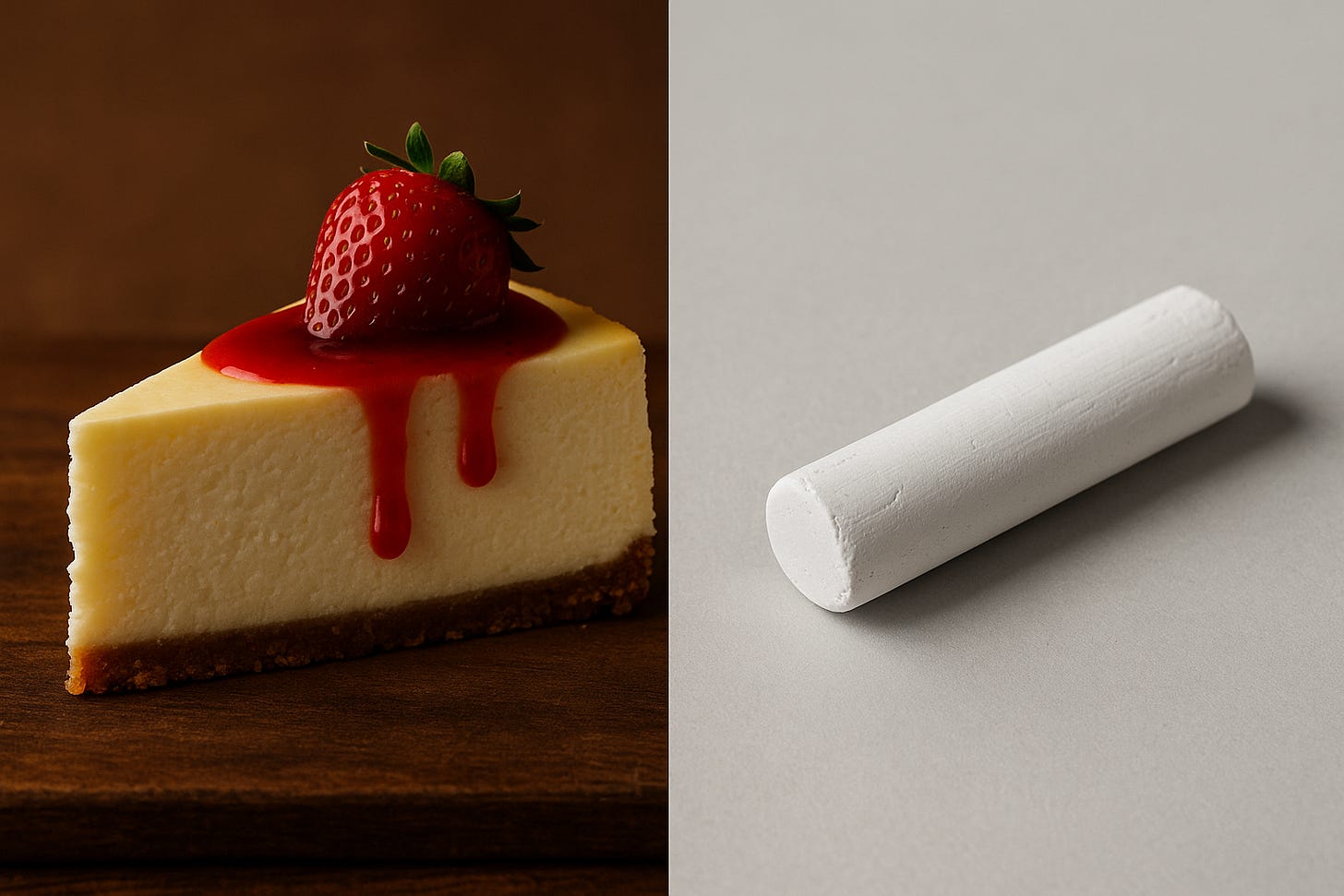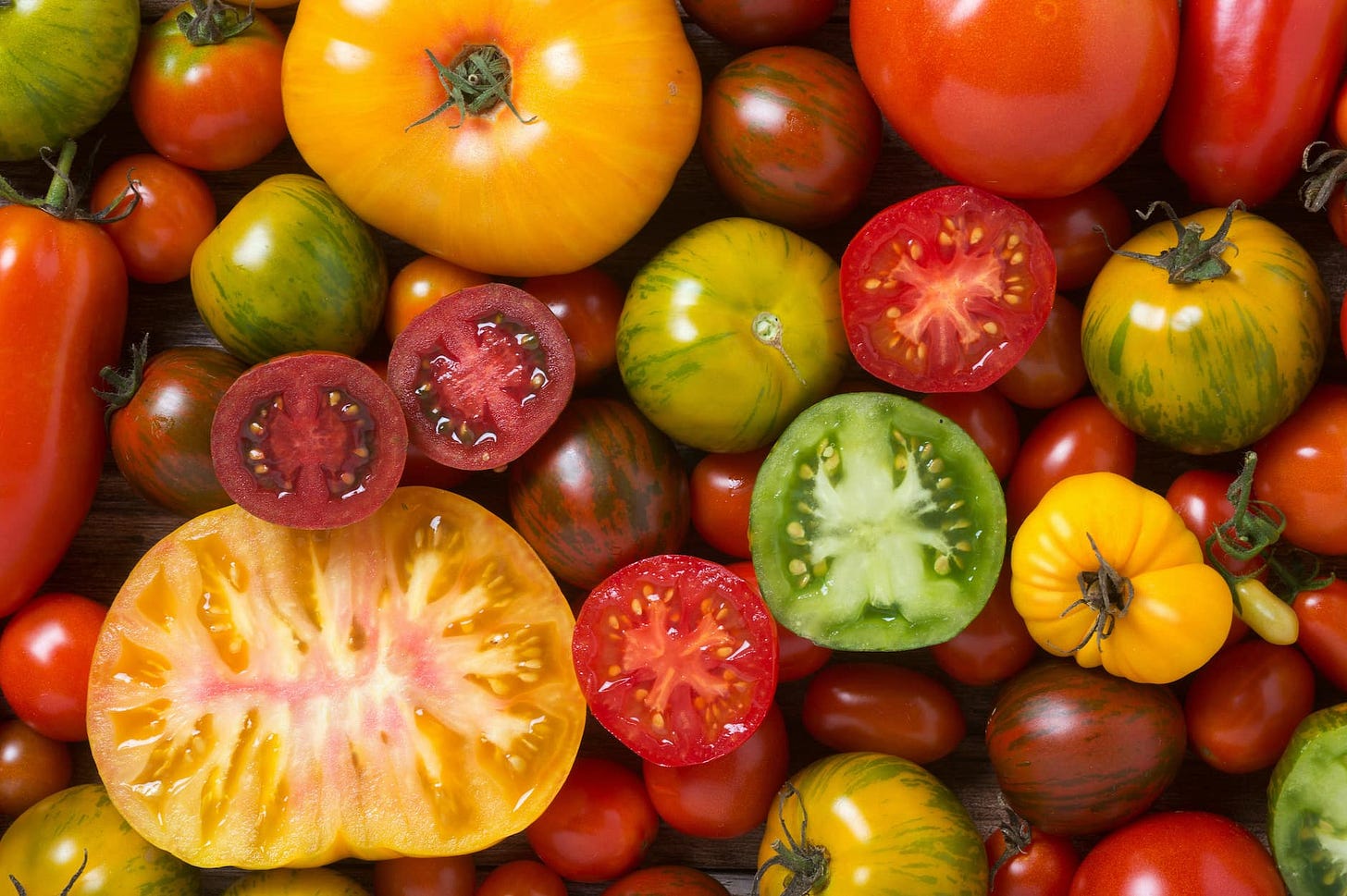Why Eat Chalk When You Can Eat Cheesecake?
Striving for authenticity in an increasingly artificial world
Have you ever had a real tomato? Until I was in my 20s, the only ones I had ever tasted were those light pink hothouse ones that might sit perfunctorily atop a mound of iceberg lettuce, whose taste can be described more or less as tolerable. Then, on a trip to southern Vermont, I discovered something amazing: not only did they come in all kinds of sizes and colors, but, astoundingly, they were delicious.
We are living through an age of duplication.
Cyber bots pose as humans, influencers incant ideologies dressed up as lifestyle, and what used to be called news has morphed into performance art. Now, with generative AI producing words, sounds, and images in yoctoseconds, you may find yourself asking an existential question:
What counts as real?
This isn’t just an abstract concern. You can literally taste it.
RFK’s work in this arena notwithstanding, much of our food, for example, is thoroughly artificial. It’s genetically engineered, chemically preserved, processed beyond recognition, and packaged in bright plastic. A “cheesecake” made of almond starch and artificial vanilla may look like the real thing. But what it offers in convenience and appearance also lacks in-depth flavor and sustenance.
You might fill up on it, but you won’t feel full.
The same goes for so many aspects of life in this rapidly transforming world: content, conversation, connection, and creativity. The deeper elements—what nourishes the body, mind, and soul—are being hollowed out and replaced by all things digital. We’re being offered chalk and assured it’s cheesecake.
What, then, is worth trusting?
How do we recognize and hold on to authenticity—in ourselves, in what we consume, and in what we create?
To that end, I’d like to offer what I call The Three T’s:
Time
Anything truly valuable takes time—like the slow fermentation of sourdough, the handcrafting of a beautiful wooden table, or the decades it takes to master an instrument. Our culture is obsessed with speed, and given that, slowness is now rebellion—a deliberate bucking of our runaway train pace.
If something is produced instantly and effortlessly, it likely carries the compromise of that haste. This is not a call to become Luddites or a nostalgic pining for simpler times, but a reminder that time often acts as a crucible. It distills the essence of a thing and is a filter for quality.
Whether it’s a thought, a dish, or a worldview, ask yourself: Did it take time to become what it is?
Trouble
When I say trouble, I don’t mean something catastrophic; I mean real effort, struggle, and wrestling. That which is real is generally forged through prolonged abrasion.
I’ve come to believe that much of what we call “quality” emerges from internal wrangling: sleepless nights, discarded drafts, and challenged and refined arguments. There’s a kind of spiritual weight that comes from things that cost us something to produce.
In Jewish tradition, there's a powerful (yet obvious) line from Pirkei Avot (5:23): “According to the effort is the reward.” Not all effort is rewarded outwardly, of course. But inwardly, something shifts. We become deeper and grow strong roots.
Tradition
Innovation is exciting. But not all that is new is wise, and not all that is old is obsolete. Tradition—when not rigid or weaponized—can be a vessel for accumulated human insight. It's a form of cultural and spiritual memory.
The practices, ideas, and stories that survive for generations often do so for good reason. They are encoded with truths tested by time and pain. When we’re faced with too many options, too many simulations, and too little clarity, the tried-and-true can help us refocus.
Rediscovering the Taste of Fullness
Image: farmersalmanac.com
We are not meant to live on artificial inputs alone—not in our bodies or spirits. A generation ago, we might have laughed at the idea that virtual relationships, digital art, synthetic food, and algorithmic wisdom would become the norm. But here we are.
And so the real task—perhaps even the spiritual task—is to slow down and discern. To ask again and again: What’s real? What’s rooted? What feeds me in ways I didn’t even realize I was starving for?
There’s a line I came across years ago that haunts me in its simplicity:
“We have been hungry for so long, we’ve forgotten the taste of fullness.”
My hope is that we can remember that we can choose substance over surface, that we can pause long enough to taste the cake and reject the chalk.
Because when we do, we’ll not only nourish ourselves, we’ll become part of the solution—carriers of a more grounded, more real, and more human future.





"Have you ever had a tomato?" You just made my morning. An actual lede! Writing, not content! (If I see one more article beginning with "It's no secret that..." Grrrrr.) Wonderful piece, beautifully written and
thought provoking. Thanks.
I’m reminded of the great medieval poet’s love of tradition: Judah Halevi. Lovely piece! Thank you